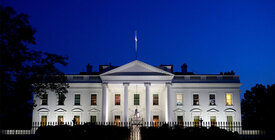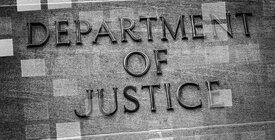Since 2020, election officials across the country have been thrust into the middle of election deniers’ campaign to undermine faith in American democracy. Scapegoated for outcomes that some politicians and voters don’t like, election officials have faced increasingly violent rhetoric and attempts to criminalize their work that are fueled by disinformation and conspiracy theories.
Fortunately, these dedicated public servants have largely withstood the attacks, and the election denial movement faltered at the ballot box in the midterms, as voters across the country rejected many of the candidates touting its baseless conspiracy theories.
But election officials now face a new set of threats from Project 2025, a conservative policy agenda that not only proposes to withhold critical federal support for their work but also threatens to weaponize the Justice Department and other federal agencies to further politicize election administration and revive unfounded attacks on election officials.
Election officials have faced unprecedented attacks in recent years.
Since the failed effort to overturn the 2020 election, election officials and workers across the country have been the targets of unprecedented attacks simply for doing their jobs. The Brennan Center’s 2024 annual survey of local election officials found that 38 percent have experienced threats, harassment, or abuse. More than a third know a colleague who resigned at least partly due to safety concerns, and 62 percent are worried about politicians interfering with their work.
The threats and violence are driven by conspiracy theories. Perhaps the most infamous example is Georgia election workers Ruby Freeman and Shaye Moss, who received hundreds of threats overnight after former Trump lawyer Rudy Giuliani falsely accused them of committing fraud in the 2020 election. But other examples abound.
Too often, state and local leaders have contributed to this hostile climate. Since 2020, a dozen states have enacted new criminal laws with harsh penalties targeting everything from minor mistakes to legitimate efforts to help voters exercise their constitutional rights. One of the most egregious examples is Texas’s Senate Bill 1, which makes it a crime for election officials to “solicit the submission” of mail-in ballots — even where the voter is entitled to vote by mail — and carries a punishment of at least six months’ imprisonment and fines of up to $10,000. Prosecutors and law enforcement officials also have piled on with threats of investigation and prosecution that often lack evidence but nonetheless upend election officials’ lives.
All of this has contributed to unprecedented attrition among election officials, which created an opening for election deniers like Steve Bannon to try to orchestrate a hostile takeover of our elections.
So far, the worst has not come to pass. In 2022, prominent election deniers who ran for statewide offices in swing states all lost, usually running behind other statewide candidates from the same party. Most local election officials who left were replaced by people equally dedicated to upholding democratic values, and even some who didn’t trust the system changed their views once in office. Still, election denial poses an ongoing and evolving threat.
Project 2025 threatens to amplify attacks on election officials and throw the weight of the federal government behind those antidemocratic efforts.
Project 2025 threatens to reverse progress made over the last four years by stripping crucial federal resources from election officials and weaponizing the Department of Justice against officials who make decisions the administration disagrees with.
Local election officials have strengthened important partnerships with federal agencies in recent years to address emerging threats and keep elections safe and secure. In particular, election officials across the country and political spectrum have relied on the Cybersecurity and Infrastructure Security Agency (CISA), which is part of the Department of Homeland Security. With little or no IT support of their own and cyber threats to election infrastructure emerging as a serious and growing challenge, election officials have leaned on CISA’s expertise and resources to navigate evolving security threats and disseminate accurate information about elections. The agency has also played an important role since 2020 in helping local election offices improve their physical security.
Project 2025 would quash this collaboration. It would gut CISA, removing most of the assistance it provides on security and barring it from any role in countering election-related conspiracies — which can lead to physical threats against election workers and infrastructure — including those originating from hostile foreign actors. And it would tie federal grants to unreasonable conditions, like requiring localities to share sensitive private information from voter registration databases, further dampening state and local cooperation with federal agencies.
Project 2025 does not simply propose to withhold federal support that many election jurisdictions benefit from, however. If fully adopted, it could lead to the outright weaponization of federal power to retaliate against election officials for decisions that federal officials don’t like. Indeed, the chapter on the Department of Justice explicitly suggests that the Pennsylvania secretary of the commonwealth should be prosecuted for issuing guidance protecting access to mail voting during the height of the Covid-19 pandemic. Although the guidance was intended to help voters exercise their rights, the authors of Project 2025 argue that it violated a 19th-century federal civil rights law (one that, ironically, was crafted in part to protect voting rights).
More broadly, Project 2025 suggests that the next president should ignore the long-standing practice of refraining from interference in key aspects of Justice Department operations, such as decisions around specific investigations and prosecutions. It also calls for gutting the federal civil service and reclassifying thousands of career employees (likely including many prosecutors) as at-will political appointees.
The risk of a politicized Department of Justice targeting election officials is very real. A former department official, Jeffrey Clark, played a prominent role in the attempt to overturn the 2020 election, including through his White House–backed efforts to pressure the DOJ into endorsing bogus allegations of widespread fraud. Officials also floated the idea of seizing voting equipment, and former President Trump was infamously recorded threatening Georgia’s Republican secretary of state, Brad Raffensperger, with prosecution.
Today, election-related threats continue to feature prominently in the 2024 campaign. Trump has repeatedly said he would prosecute Mark Zuckerberg for donating more than $400 million to help with election administration in 2020 (in the face of funding shortfalls that Congress refused to fully address). Kash Patel, a former Trump administration official and current campaign adviser, has similarly pushed conspiracy theories while promising that a new Trump administration will find and retaliate against “conspirators” who “helped Joe Biden rig presidential elections.” None of these threats should be taken lightly.
• • •
Facing unprecedented challenges from election deniers and foreign interference, election officials need more support than ever to carry out the complex, technical work of administering elections. Yet Project 2025, if enacted, would strip away crucial federal aid and escalate the politicized attacks they are already suffering — with potentially dire consequences for our elections.





